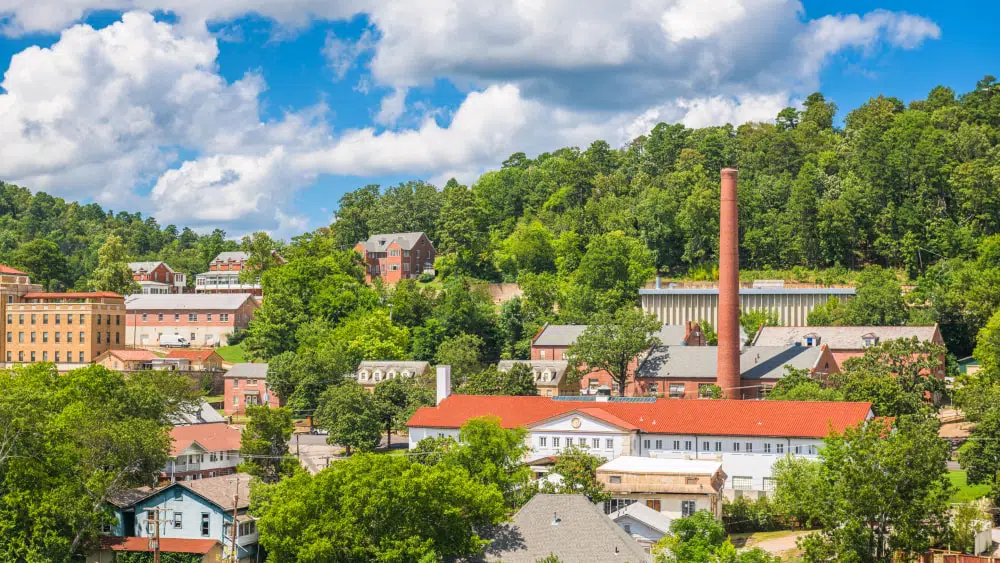
If you want to build a house in Arkansas, you’ll be glad to know that it ranks as the fourth least expensive state for home building. The cost to build a house in Arkansas averages $162,662, according to GoBankingRates. One reason the cost to build a house in Arkansas is lower than in other states is that labor costs there are the least expensive in the country at an estimated $12.38 an hour.
The estimated cost to build a house in Arkansas varies according to where you want to build your home. Typically, it costs more to build a home in cities and sought-after towns, so you’re likely to spend more to build a house in Little Rock, Fayetteville, or Jonesboro than in a more rural area. Other factors that impact how much it costs to build a house in Arkansas include the size of the home, the materials you choose, and how much land you want around it.
Custom vs. Production Homes
To get an idea of how much it costs to build a house in Arkansas, it’s important to understand the type of home you want to build. Generally, you can build a custom home, one that’s designed just for you, or a production home, which is one of several homes built by a builder within a planned community or a subdivision of homes.
A custom home often costs more than a production home because you need to hire an architect or a design-build firm. The cost varies according to the land you buy and whether it has been prepared with the infrastructure needed to build. Usually, it takes longer to build a custom home in Arkansas compared to building a production home in the state.
This article focuses on production homes, which usually include the price of the land, permits, architecture, materials, and labor in one price. Sometimes you need to pay extra for a particular lot or for optional features if the builder offers them. Some builders offer semi-custom homes that allow a higher level of personalization.
Step-by-Step Process to Build a House in Arkansas

It takes an average of seven months to build a house in Arkansas, but there are numerous factors that affect how long it takes to build a production home, including how much your builder has done in advance such as preparing the land and requesting initial permits to build.
The following steps outline the process to build a house in Arkansas.
1. Budget for your new home
Before you start searching for a community or a builder, the most important step is to evaluate your finances and decide how much you can comfortably afford to spend on a monthly payment for your new home in Arkansas. Your housing payment includes the principal and interest on your loan, property taxes, homeowner’s insurance, and in most cases, homeowner association dues.
At the same time, you should consider how much cash you have available for a deposit, a down payment, closing costs, and moving expenses. If you must sell your current home before you build a house in Arkansas, you may want to consult a real estate professional to get an idea of your home’s value. Closing costs in Arkansas average 2 percent to 5 percent of the purchase price of a home. In some cases, your builder will cover those costs, but you should be prepared to pay them.
Once you’ve done your personal financial evaluation, you can consult a lender to get an estimate of how much you can borrow. A lender will check your credit to see if you have any issues that need to be corrected, help you understand your price range, then provide you with a preapproval letter. Getting preapproved for a loan doesn’t commit you to that lender, so you can always choose a different one when you finalize your choice of builder.
The price per square foot to build a house in Arkansas ranges from $90 to $200, which would be $225,000 to $500,000 for a 2,500-square-foot house. That broad price range reflects the factors that impact your price, including location, land costs, the size of the home, the style of the home, and the materials used to build the home.
Materials typically make up about 50 percent of the total cost to build a home in Arkansas, while labor costs represent 30 percent to 40 percent of the overall cost.
A production builder offers the advantage of being able to buy materials and appliances in bulk for multiple homes at a discount. Your choices will also make a difference, so you can work carefully with your builder to stick to your budget.
Lumber to build a home in Arkansas can cost from $25,000 to $65,000, and an asphalt shingle roof can cost $5,000 to $11,000 depending on the size of the home. These costs will be wrapped into your total home cost, but if your builder offers you options, you may be able to save with certain materials or roof styles.
Your interior feature choices will also affect the price. Some builders offer design packages at different price points and others offer more personalization.
Part of your monthly mortgage payment may include homeowner association dues, which vary according to the amenities and size of the association.
Homeowner’s insurance in Arkansas costs an average of $3,439 per year, according to Insurance.com, which is higher than the national average of $2,305 and the fourth highest average in the country.
However, property taxes are lower in Arkansas than in most other states, at an effective rate of 0.61 percent compared to the national average of 1.07 percent, according to SmartAsset.com. The average property tax bill in Arkansas is lower than $800 annually, compared to the national average of $2,578.
2. Choose your builder and community

Go online to start your search for a community and a builder for your new home in Arkansas. Narrow your search by location and price range, then visit those communities virtually. Many communities have more than one builder, so you may want to visit the websites of each builder to gather more information about their homes. You can check out renderings of homes, floor plans, photos, and sometimes virtual tours. Once you’ve narrowed your options, you can then visit model homes and communities in person. A sales professional on-site can answer your questions, and you can ask residents about their experience with the builder. You can also check out builder reviews at TrustBuilder®.
3. Line up your financing
After choosing the community where you want to build a home in Arkansas, you’ll need to apply for a mortgage. You can go back to the lender who provided you with a preapproval letter, but many builders also have an in-house lender or a list of preferred lenders. It’s in your best interest to apply for a loan with one of those lenders because builders sometimes offer to pay your closing costs or provide another incentive to work with them. In addition, you may have a more streamlined experience with a lender who already knows your builder. You can also compare rates and terms with other lenders to make sure you’re choosing the best option.
When you sign the contract to build your new home, you’ll need to make a deposit according to the contract terms. The down payment will be paid on the closing date. You may want to look into state and local homebuyer programs to see if you qualify for down payment assistance in Arkansas.
4. Choose your lot and your floor plan
Depending on how many lots and floor plans are available in the community where you’re building your new home, you may have some options to choose from. You can work with the on-site sales professional to determine which floor plans can be built on specific lots. Some lots may require additional money because of their size or desirability.
You’ll also want to ask about plans for development that could impact your view or the noise around your house. When you choose your floor plan, be sure to understand which features are included and whether options are available. It may be easier to finance some options into your purchase rather than make changes in the future.
5. Be aware of permitting and inspections
The process of building a house in Arkansas includes permits and inspections, which your builder will handle for you in a production home. Your builder must meet the statewide building code in Arkansas. Some local jurisdictions also have additional building code requirements. If you’d like to hire your own inspector, you can ask your builder about the best time to schedule one.
6. Consider the local climate

Arkansas has a relatively humid climate and gets significantly more rain than other parts of the United States. The state has hot and humid summers, but shorter winters than northern states. Much of the state is prone to floods and tornadoes. You may want to talk with your builder about home designs and materials that are more resistant to flooding and tornadoes.
Construction Period
Stay in close touch with your builder while your home is being constructed. Your timeline depends on many variables, such as the availability of materials, contractors, inspectors, and even the weather. You also should be in contact with your lender, who can advise you on when to lock in your loan and prepare to move into your new home in Arkansas.

Michele Lerner is an award-winning freelance writer, editor and author who has been writing about real estate, personal finance and business topics for more than two decades.
 How to Build a House in Wyoming
How to Build a House in Wyoming